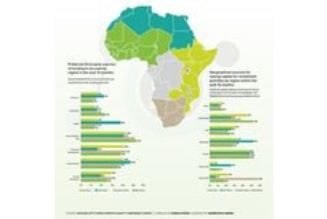Economy
Kenyan car buyers hit by 35pc import duty in EAC deal
Tuesday July 04 2023
Second-hand motor vehicles at Eyre Motors yard in Mombasa County. FILE PHOTO | WACHIRA MWANGI | NMG
Kenyan car buyers have been hit by a 35 percent import duty after the East African Community (EAC) approved an application by Kenya to raise duty on motor vehicles under the common external tariff, piling pressure on a sector being pounded by a depreciating currency.
The review of the import duty from the current 25 percent, which has been since approved by the EAC Council of Ministers, will result in double-digit increases in prices of imported cars including those carrying 10 or more passengers, station wagons, racing cars and those involved in the transportation of goods among others.
Effectively, this means that vehicles imported into the country will now fetch a higher price locally than they will in regional peers such as Uganda and Rwanda.
Read: How bonded warehouses will change car import taxes
“The increase in customs duty on imported cars will translate to about a 14 percent increase in the cost of importing vehicles. A convergence of this duty hike and petrol price increase could see consumers move to green mobility,” said Robert Waruiru, the managing partner of Ichiban Tax and Business Advisory and also the chairperson of the Institute of Certified Public Accountants of Kenya Public Finance Committee.
“In the interim, local assemblers may feel the tailwinds of this policy change even as second-hand importers feel the squeeze, especially on the volatile exchange rate.”
The EAC deal also approved a request by Kenya to keep elevated taxes on household gadgets such as mobile phones and television sets for another year in efforts to support tax measures by the William Ruto administration to raise Sh211 billion in additional revenue this financial year.
The gazette notice was published on Friday by Burundi’s Minister for EAC Affairs Ezekiel Nibigira, who chairs the EAC Council of Ministers.
Dealers said the application of the new 35 percent import duty on second-hand and new imported vehicles will see prices of cars increase by hundreds of shillings, adding to the already higher prices as a result of weakening shilling and rising cost of credit.
In addition to import duty, vehicles attract excise duty ranging from 25 percent to 35 percent depending on the size of the engine and value-added tax of 16 percent, payable cumulatively and in that order.
This means a change in import duty impacts the excise and VAT charges as the value is compounded for taxation purposes.
The new duty will see total taxes on a car with a custom value of Sh998,621—comprising the cost, insurance and freight(CIF) charges— rise by Sh129,821 to Sh996,124, according to the calculation by one dealer.
This is inclusive of the import declaration fees and railway development levy, which are charged rates of 2.5 and 1.5 percent of the customs value, respectively.
According to official data, Kenya imports an average of 81,791 fully built vehicles every year and has an installed vehicle assembly capacity of 34,000 units.
Charles Munyori, secretary general of the Kenya Auto Bazaar Association, which represents second-hand car dealers, said the new measure will slow down sales further.
“It [higher import duty] will have a multiplier effect because you add that when you are doing excise duty and VAT at the end of it all,” Mr Munyori said on the phone.
“Already we are suffering in terms of sales as we still have stocks which have been with us for the last one year. I don’t know for how long we are going to go through this because the new duty will hit us even harder.”
Motor vehicle dealers had earlier raised car prices citing the depreciation of the shilling and rising borrowing costs.
They said in April they were not only battling a slide in the value of the local unit against major international currencies but also a shortage of the US dollars which had affected timely payment of suppliers abroad.
The increased cost of operation had prompted the dealers and assemblers, who largely rely on imports, to adjust prices upwards to recoup the expenses and protect margins.
“For the [rising dollar] strength, we are responding through price adjustments. The changes have been upwards of 10 percent,” Gabriel Kanyingi, the general manager for commercial finance at Isuzu East Africa, told the Business Daily in April.
“The implication of all this will be felt in the second half of the year. High prices are likely to dampen demand. If the situation is not reversed, we shall be faced with a reduced order pipeline which will affect production volumes too.”
And in a move aimed at preserving tax revenues from mobile phones, Kenya has also been granted a one-year extension to continue charging a 25 percent duty, which is higher than Uganda’s 10 percent and CET rate of zero percent.
This is on top of the 10 percent excise duty, also introduced last year, raising the cost of mobile phones by more than 35 percent when levies and fees are factored in.
Tax experts say the continuation of higher import duty and the excise duty on the purchase and use of mobile phones are aimed more at raising revenue rather than protecting the proposed setting up of a manufacturing plant for low-cost smartphones.
“The approach that Kenya is using is protectionism, but economically how many mobile manufacturers do we have in Kenya that need protection?” posed Hadijah Nannyomo, a tax partner at EY.
“You are making it hard for Kenyan traders to compete with those in Uganda and Rwanda. What you are doing is to force a mobile dealer in Kenya to consider being based in Uganda and Rwanda where it is more profitable.”
Read: State seeks to cut car prices with VAT, excise duty scrap
Industry players have argued that higher taxes will push most phone buyers to the black market leaving authorised dealers with mostly corporate clients.
Parallel imports are smuggled into the country without paying taxes and traded on a cash basis but lack warranties or after-sale services offered by licensed sellers.
Additional reporting by Julians Amboko.









